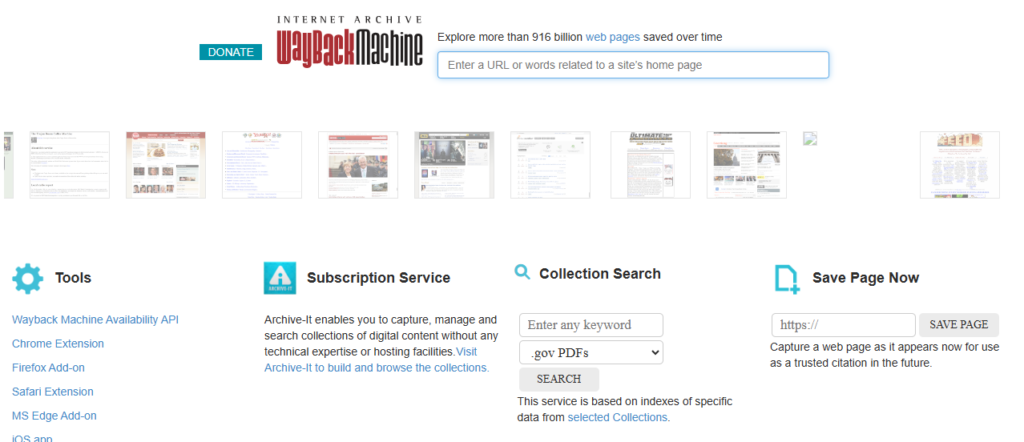
Wayback recovers from october DDoS attack and Restores ‘Save Page Now’ Service
The Internet Archive is recovering after a series of DDoS (Distributed Denial of Service) attacks took down its servers in early October. The nonprofit, which runs the Wayback Machine, has now restored the “Save Page Now” service, allowing users to save web pages for future use.
Wayback Machine is Back Online
Since October 14, the Wayback Machine has been working again. While it was down, users couldn’t upload new pages, but now they can. This means people can save important websites again for later access.
Web Pages from October 9 Can Now Be Archived
The Internet Archive also confirmed that any web pages uploaded since October 9 will now be archived. Before that, the site was down due to the attacks. Now, it’s back up and running, ensuring pages from that time are safely stored.
DDoS Attacks and Data Breach Happened at the Same Time
The DDoS attacks came right when the Internet Archive also revealed a data breach that exposed over 31 million user records. Security expert Troy Hunt said the two events were probably unrelated and caused by different groups.
Securing Digital Preservation for the Future
Even though these attacks caused major problems, the Internet Archive is working hard to fix everything. The organization remains dedicated to keeping the web’s history safe and accessible for everyone.
What Does the Wayback Machine Do?
The Wayback Machine is a digital archive created by the Internet Archive, which is a nonprofit organization. It allows users to view and access past versions of websites. Essentially, it’s like a “time machine” for the web. You can enter a website’s URL and choose a date from the past to see how that page looked at that time.
This is especially useful for:
- Researching older versions of websites: If a website has changed over the years, you can see what it looked like months or years ago.
- Preserving web history: The Wayback Machine keeps a record of web pages that might otherwise be lost due to site changes, removals, or server failures.
- Legal and compliance purposes: It helps keep a record of web content for future reference in case of disputes or audits.
How Does the Wayback Machine Work?
The Wayback Machine works by crawling and archiving websites regularly. It saves snapshots of web pages and stores them in a huge database. Users can search for any archived page by entering the URL and selecting the date they want to view.
Key Differences Between Wayback Machine and Its Competitors
- Scale: The Wayback Machine is the largest and most comprehensive web archive, automatically archiving millions of websites over time.
- User Control: Some competitors, like Archive.is and WebCite, let users manually submit pages for archiving, which is more customizable than the Wayback Machine’s automatic crawling.
- Purpose: Wayback Machine aims to preserve the entire web’s history for public access, while competitors like WebCite and Perma.cc are more focused on academic and legal purposes.
How Does the Wayback Machine Make Money?
As a nonprofit organization, the Internet Archive (which operates the Wayback Machine) doesn’t rely on commercial profit models like most tech companies. However, it still needs to fund its operations and cover costs. The main ways the Internet Archive raises money are:
- Donations: The Internet Archive is supported through donations from individuals, corporations, and foundations. These donations help fund the ongoing maintenance, development, and expansion of the archive, including the Wayback Machine.
- Grants: The organization also receives grants from various philanthropic organizations, including those focused on digital preservation, education, and public access to information.
- Partnerships: In some cases, the Internet Archive forms partnerships with universities, libraries, and other institutions to help fund its work.
How to Donate to the Internet Archive
If you find the Wayback Machine and the Internet Archive’s services valuable, you can contribute by donating directly to the organization. Donations help support their mission to preserve and provide free access to digital content.
You can donate via the Internet Archive’s official website. They accept one-time and recurring donations, and donors can choose to support specific projects or the archive in general.
Conclusion
While the Wayback Machine is the most popular tool for accessing archived websites, there are several other options available depending on your specific needs. Whether you need a quick snapshot of a page, a reliable citation for research, or a broad archive of the entire web, these services help ensure that digital content is preserved and accessible for future generations.
By donating to the Internet Archive, you help keep this important digital preservation work going, ensuring that the history of the web remains available to everyone Donate here for wayback.




